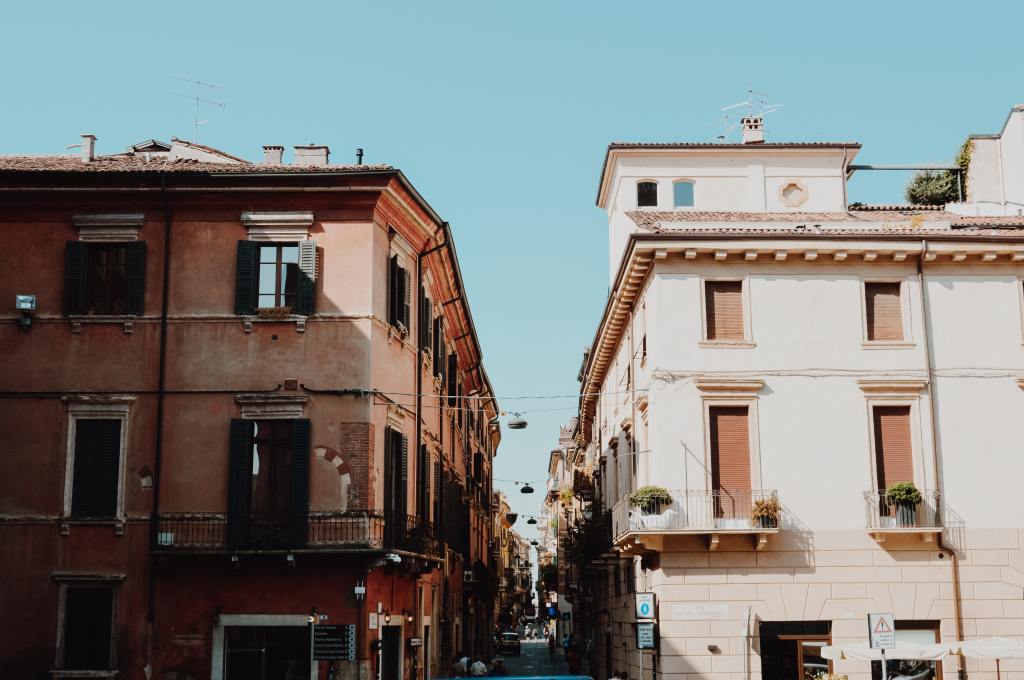On our canal, in the absence of trade and the din of tourists, we’re left to listen to the slap of waves, the clicks of loose rooftiles, and for the stealth of a silent predator. Beyond the city, there’s only water and the horizon, no sailboats, fishing boats, powerboats, or cruise ships. No vapour trails scratch the glassy-blue sky. Hungry gulls and pigeons cry for cold crusts, cones and crisps. Night folds on us like a wartime blackout curtain.
On our canal, a yellow and red ambulanza slides past our watchful faces.
On an evening of the second week of our confinement, Bella Seràgnoli throws open her balcony doors. We peek at her from behind our curtains. Dressed in an evening gown and her great-grandmother’s jewels, she calls to us to join her. “We cannot visit one another, but we can look at one another!” She pours herself a class of prosecco and plays Les Contes d’Hoffmann, calming the waves and gulls—and distracting us from our worries, our fears.
On the following evening, Marcello toasts us all with a glass of red and plays La Traviata. In the evening, La Bohème pours from the newlyweds’ apartment. We disapprove of the whiffs of marijuana coming from their balcony but applaud their taste in opera.
On our canal, a yellow and red ambulanza slides past.
On our canal, another comes and goes.
On an evening we cannot forget, Raffaele howls at the passing of his ancient mama like a dog mourning its mistress.
On all the following nights that week, Raffaele howls.
On a Saturday morning, an ambulanza comes and goes. That evening, Dino’s family appears in black on their balcony. Their boarder, Marco the piano tuner, plays “Les Oiseaux dans la Charmille.” They weep and Raffaele coughs. He coughs and coughs.
On that Sunday, none leave house – alive. The city’s church bells ring but not a priest in sight. Three ambulanze carry away schoolmaster Pietro, kiosk manager Emilio and angelic Raffaele; we pray for Raffaele, the boy we threw stones at for being slow-eyed and gape-mouthed, the youth who failed to finish school, the man who swept piazze of rose petals after our weddings, who endured the stone-throwing of our children, and whose howls we now miss like the din of tourist trade. A notice of his death appears in newsprint along with so many, too many others, and our bones vibrate like tuning forks for the lack of kindness we showed the poor man his entire life.
On our canal, an ambulanza comes and goes.
On our canal, another comes and goes.
On our canal, a third.
On Tuesday, Lorenzo the Spaniard plays “Addio, del Passato Bei Sogni Ridenti” on an arciliuto. We didn’t even know he played an instrument. We didn’t even know that he had studied under the man who’d toured with Leonard Cohen; we are charmed.
On Friday, a surprise. Alain, a man about whom we know nothing more than how familiar he is with storefront windows reflecting his correct handsomeness, elegance and style – and that women regularly whisper in accents into his intercom, “I’m here, darling,” – sings “Che Gelida Manina.” A natural! The women among us swoon, and among the men it’s rumoured that Alain’s cousin was Pavarotti! Oh, how we clap, even the children.
On our canal, an ambulanza comes and goes.
On our canal, another comes and goes.
On our canal, a third, a fourth, a fifth.
On all the days of the week, ambulanze come and go.
On every evening, we play and sing and applaud. We cheer our praise. We cheer our encouragement. Some of us, shy at first, reveal incredible talents, instrumental, vocal, and as DJs. The newlyweds put on a rave! (Never mind their marijuana! We were young once, too.) Of course, not all of us have talent. We laugh on karaoke night at our failure to synchronize and beg Marco and Lorenzo and Alain to treat us again to their professional performances.
On our canal, an ambulanza stops at Bella Seràgnoli’s house. Strapped to a gurney, she’s the ghost of herself without the sheen of her evening gown and the sparkle of her great-grandmother’s jewels.
On our canal, another ambulanza takes Lorenzo the Spaniard. He lasts only a few days in intensive care.
On our canal, a third, a fourth, a fifth ambulanza comes and goes as blue lights glow in our windows – TVs. Crazed, we’re watching processions of military vehicles carrying away the dead of Bergamo. Could be our dead, your dead. Where is the priest?
On our canal, we’ve lost count of our losses. On our canal, we’ve lost count of the times we’ve bowed our heads. Church bells peel and we throw fits on our balconies. One among us plays Andrea Bocelli. “Ave Maria,” “Alleluia” and “Nelle Tue Mani.” We are silenced.
On the horizon, the sea and sky go mourning black.
About The Author
Meredith Wadley lives and works in a medieval microtown on the Swiss side of the Rhine River. Her most recent fiction is published or forthcoming in Disquiet Arts, Dribble Drabble Review, Collateral, Flash Fiction Magazine, Gone Lawn, JMWW, Lammergeier, Longleaf Review, Lunate Fiction, and Orca Lit. Her work can be found at http://www.meredithwadley.com, and she’s on Twitter: @meredithwadley.
Bandit Fiction is an entirely not-for-profit organisation ran by passionate volunteers. We do our best to keep costs low, but we rely on the support of our readers and followers to be able to do what we do. The best way to support us is by purchasing one of our back issues. All issues are ‘pay what you want’, and all money goes directly towards paying operational costs.























Leave a Reply